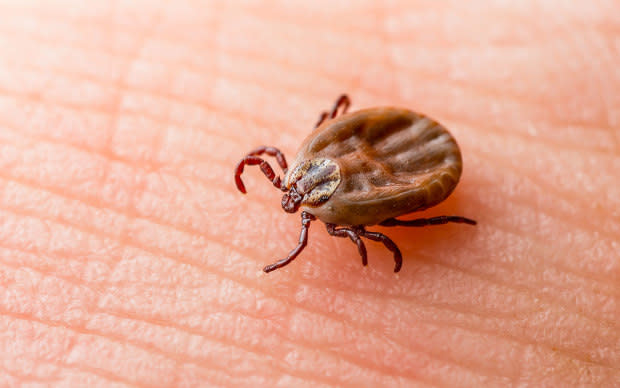Lyme Disease Isn't the Only Tick-Borne Illness—Here's What Else You Need to Look Out For

iStock
Lyme disease isn’t the only tick-related illness to worry about this summer: Enter Alpha-Gal Syndrome and Heartland Virus.
When my husband Scott keeled over in pain on a road trip through Alabama last summer, we assumed food poisoning was the culprit. After all, he's 47 and we'd had sushi the night before. Three weeks later, when he was admitted to the Nashville VA Medical Center, I started to worry.
The months followed in a whirlwind of tests: a colonoscopy, an endoscopy, CT scans, an EKG, blood panels galore and too many doctors’ visits to count. It wasn’t until a casual conversation with a doctor friend that we got a lead on the problem: She thought it might be Alpha-gal syndrome, a potentially life-threatening allergic reaction triggered by the consumption of mammal products. After requesting a test from the VA, the results immediately came back positive. And the likely cause of all of this? A tick bite.
You’ve likely heard of Lyme disease; after all, it’s the most common tick-borne disease (TBD) in the U.S., according to Dr. David J. Burrier, MD, UPS Chief Medical Officer at Cleveland Clinic. But equally concerning are Alpha-gal syndrome and Heartland virus—transmitted by the lone star tick. While neither is as widely known as Lyme and Alpha-gal isn’t yet tracked by the Centers for Disease Control and Prevention (CDC), lone star tick infection numbers are growing in the United States, especially in the Southern and Eastern states.
Here’s what you need to know.
Related: Keep Yourself Safe From Ticks With These Tips
Tick-Borne Diseases to Know About
Every year tick-borne diseases (TBDs) like Lyme disease result in as many as 500,000 diagnoses in the United States, the CDC reports. While tick exposure can occur year-round, ticks are most active during warmer months from April to September.
Lyme disease
Transferred through the bite of an infected black-legged (or deer) tick, Lyme disease may trigger a fever, headache, fatigue and a characteristic skin rash called erythema migrans; it also can lead to long-term lingering side effects if not addressed quickly, Dr. Burrier says. If you develop a rash in the weeks following a tick bite, see your doctor.
Alpha-gal syndrome
Alpha-gal is a sugar molecule found in most mammals, and Alpha-gal syndrome (AGS) causes the infected party to develop an allergy to mammal products, which can include pork, beef, rabbit, lamb, venison and other products made from mammals like gelatin, cow’s milk and milk products. Most AGS patients must refrain from consuming all mammal byproducts, including many medications that contain gelatin.
Symptoms of an Alpha-gal allergic reaction—including swelling of the lips, face, tongue and throat, or other body parts; wheezing or shortness of breath; a runny nose; stomach pain, diarrhea, nausea, or vomiting; sneezing; and headaches—are often delayed compared with other food allergies with reactions—which is what makes this condition tricky to immediately pinpoint. “Usually, symptoms don't present until seven to 14 days after the tick bite,” Dr. Burrier says. More severe cases may trigger an anaphylactic reaction in the patient that could result in serious hives and even restrict airflow.
The presence of Alpha-gal antibodies can be measured and confirmed by a simple blood test, like my husband got, or skin testing, Dr. Burrier says. Patients’ skin is exposed to the extract from red meat; if allergic, a hive will appear at the test site. “If you develop a rash or fever within several weeks of removing a tick, see your doctor, he says.”
While the CDC does not yet track AGS-specific cases, an independent study reported 34,256 confirmed cases (32.4 percent of all participants) from the testing period of July 2010 to December 2018. The number of AGS-positive patients increased six-fold from 2011 to 2018.
Heartland virus
Heartland virus (HV) symptoms include fever, fatigue, decreased appetite, headache, nausea, diarrhea and muscle pain; since it’s a virus, there’s no vaccine or specific medication to treat it. However, if you’re diagnosed with HV, your doctor may give you IV fluids or prescribe other pain meds as treatment. As of January 2021, more than 50 cases of HV had been reported from the Midwestern and Southern states.
What to Do If You Find a Tick on You
If you find any kind of tick on you, proper removal is important. Don’t crush it beneath your finger. “Use clean, fine-tipped tweezers to grasp the tick as close to the skin’s surface as possible,” Dr. Burrier advises. “Pull upward with steady, even pressure. Don’t twist or jerk the tick.
After removing the tick, thoroughly clean the bite area and your hands with rubbing alcohol or soap and water.” To dispose of a live tick, put it in alcohol, place it in a sealed bag or container, wrap tightly in tape or flush it down the toilet.
How to Prevent Tick Bites
Dr. Burrier recommends treating clothing with permethrin [like Nix] and using DEET-containing insect repellants before going out into potentially tick-infested areas. Anytime you come inside after spending time outdoors, you should shower ASAP and check yourself for ticks. If you have dogs or cats, check them regularly too, or use a prevention treatment recommended by your vet, as household pets are common carriers of ticks.
You can find more information on ticks on the CDC website.
Next, What's Better for Ridding Yourself of Ticks, a Shower or Bath?
Sources
Dr. David J. Burrier, MD, UPS Chief Medical Officer at Cleveland Clinic
CDC: Isolation of Heartland Virus from Lone Star Ticks, Georgia, USA, 2019
CDC: Ticks
Annals of Allergy, Asthma & Immunology: Diagnostic testing for galactose-alpha-1,3-galactose, United States, 2010 to 2018
CDC: Alpha-gal Syndrome
